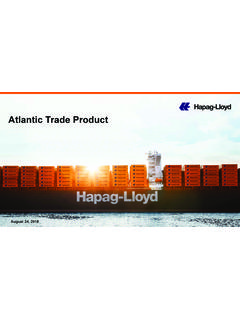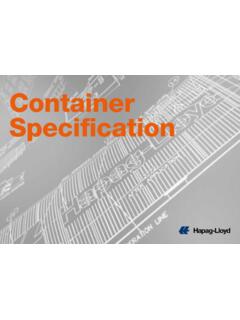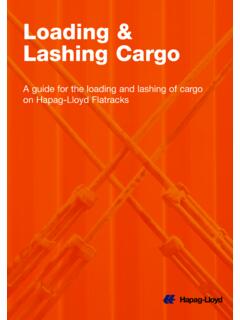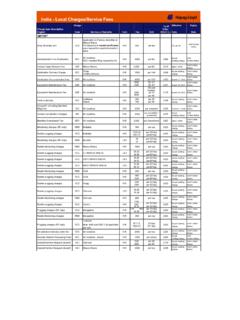Transcription of Bill of Lading · Terms and Conditions Page 1 - Hapag-Lloyd
1 9 0147345 06/16 Printed 06/16 Bill of Lading Terms and ConditionsPage 11. Definitions BIMCO means the Baltic and International Maritime Council. Carriage means the whole or any part of the operations and services undertaken by Carrier in respect of the Goods covered by this Bill of Lading . Carrier means the party named on page 2 of this Bill of Lading . Container includes any container, trailer, transportable tank, flat, or any similar arti-cle used to consolidate Goods and any connected equipment. Freight includes all charges payable to Carrier in accordance with the applicable tariff and this Bill of Lading . Goods means the whole or any part of the cargo received from the shipper and includes any equipment or Container not supplied by or on behalf of the Carrier.
2 Hague Rules means the International Convention for the Unification of Certain Rules relating to Bills of Lading of 1924 only. Hague-Visby Rules means the Hague Rules including the Visby amendments of 1968 and the amendments by the Protocol of 1979. Merchant includes the booking party, shipper and consignee named on page 2 hereof, holder, receiver of the Goods or of this Bill of Lading , and any per-son owning or entitled to the possession of the Goods or this Bill of Lading . Servants or Agents includes the owners, managers and operators of any Vessel (other than Carrier), master, officers and crew of the Vessel(s), charterers, slot and space charterers, the Vessel, all underlying carriers, bailees, direct and indirect subcontractors, stevedores, terminal and groupage operators, road and rail transport operators, or any other party employed by or on behalf of Carrier, or whose services or equipment have been used to per-form this contract whether in direct contractual privity with Carrier or not.
3 US COGSA means the US Carriage of Goods by Sea Act 1936. Vessel means any vessel including but not limited to a main line vessel, feeder ship, barge or any other means of conveyance by water used for the Car-riage of the Goods under this Bill of Lading . VGM means the verified gross mass obtained by one of the permissible meth-ods pursuant to ch. VI, part A, reg. 2 paragraph 4 of SOLAS 1974 (as amended from time to time) and the applicable regulations of the State of the loading Carrier s TariffThe Terms and Conditions of Carrier s applicable tariff are incorporated herein, including but not limited to Terms and Conditions relating to demurrage and detention.
4 The provisions relevant to the applicable tariff can be acquired from Carrier or his Agents upon request. Carrier s standard tariff can be accessed online at In the case of any inconsistency between this Bill of Lading and the applicable tariff, this Bill of Lading shall WarrantyMerchant warrants that in agreeing to the Terms and Conditions hereof he is, or has the authority of, the person owning or entitled to the possession of the Goods and this Bill of Sub-Contracting and Indemnity(1) Carrier shall be entitled to sub-contract on any Terms whatsoever the whole or any part of the Carriage, including but not limited to loading, unloading, storing and warehousing.(2) Merchant hereby agrees that no Servants or Agents are, or shall be deemed to be liable with respect to the Goods or the Carriage as Carrier, bailee or otherwise, and agrees not to file any claim against any Servant or Agent seeking to impose liability in connection with the Carriage.
5 If any claim is made against any of the Servants or Agents, Merchant shall indemnify Carrier against all consequences thereof. Without prejudice to the foregoing, all rights, exemptions, defenses, and limitations of and exoneration from liability provided by law or by these Terms and Conditions , including the jurisdiction clause, shall be available to every Servant or Agent and Vessel which shall be entitled to enforce same against Merchant.(3) The provisions of Clause 4 (2) shall extend to claims of whatsoever nature against other persons chartering space on the carrying Carrier s Responsibility(1) Port-to-Port Shipment (a) When loss or damage has occurred to the Goods between the time of loading on the Vessel and the time of discharge from the Vessel, the responsibility of Carrier shall be determined in accordance with German law making the Hague Rules compulsorily applicable.
6 The BIMCO Paramount Clause General shall be incorporated herein. (b) However, in the event that the Bill of Lading covers a shipment from or to the USA, US COGSA shall govern and apply from loading the Goods on the Vessel until discharge. US COGSA shall also be applicable during all times before the Goods are loaded on or after they are discharged from the Vessel.(c) Carrier shall not be responsible for any fault of its personnel and of the Vessel s crew (as defined in 478 German Commercial Code) in cases of damage or loss caused by fire or explosion on board the Vessel or caused by the navigation or management of the Vessel, in the latter case save for damage or loss caused when executing measures which were pre-dominantly taken in the interest of the Goods ( Error in Navigation and Fire Defenses ).
7 (d) Carrier shall not be responsible for any fault of other persons involved in the navigation or management of the Vessel, in particular pilots on board of the Vessel or the crew of a tug boat assisting the Vessel, in cases of damage or loss caused by the navigation or the management of the Vessel, save for damage or loss caused when executing measures which were pre-dominantly taken in the interest of the Goods. (e) Prior to loading and after discharge Carrier is not deemed to have custody of the Goods. Car-rier is not responsible for acts or omissions of a terminal operator to which the Goods were submitted. (f) Unless notice of loss or damage be given in writing to Carrier or its agent at the port of dis-charge before or at the time of the removal of the Goods into the custody of the person entitled to delivery thereof under the Bill of Lading , or, if the loss or damage is not apparent, within three (3) days, such removal shall be prima facie evidence of the delivery by Carrier as described in this Bill of Lading and any such loss or damage which may have occurred to the Goods shall be deemed to be due to circumstances which are not the responsibility of Carrier.
8 The notice must clearly specify the damage. Notwithstanding the aforesaid, if a Container has been delivered to Merchant, Merchant must prove that the damage to or loss of the Goods did not occur during the period after delivery, when the Container was in the custody of Merchant. (g) Compensation shall be calculated by reference to the value of the Goods at the place and the time they are delivered to Merchant, or at the place and the time they should have been delivered. For the purpose of determining the extent of Carrier s liability for loss of or damage to the Goods, the sound value of the Goods is agreed to be the invoice value plus Freight and insurance if paid.
9 (2) Multimodal Transport (a) If the place of damage to or loss of the Goods is known, the responsibility of Carrier is deter-mined by the law which applies to this leg of Carriage except in cases which are governed by Clause 5 (2) (d) below. (b) If it is established that loss or damage occurred during the port-to-port leg the Error in Navi-gation and Fire Defenses as per Clause 5 (1) (b) apply. (c) If it is established that loss or damage occurred during the port-to-port leg, Clause 5 (1) (c) shall apply. (d) In the event that part of the multimodal transport involves a shipment to or from the USA, US COGSA shall govern and apply from loading the Goods on the Vessel until discharge.
10 US COGSA shall also be applicable during all times before loading and after discharge of the Goods from the Vessel. (e) With respect to road Carriage between countries in Europe liability shall be determined in accordance with the Convention on the Contract for the International Carriage of Goods by Road (CMR), dated May 19, 1956; and during rail Carriage between countries in Europe according to the International Agreement on Railway Transports (CIM), dated February 25, 1961 or any amendments to this Convention or Agreement. (f) Unless notice of loss or damage be given in writing to Carrier or its agent at the port of dis-charge before or at the time of the removal of the Goods into the custody of the person entitled to delivery thereof under the contract of Carriage, or, if the loss or damage is not apparent within seven (7) days, such removal shall be prima facie evidence of the delivery by Carrier as described in this Bill of Lading .







